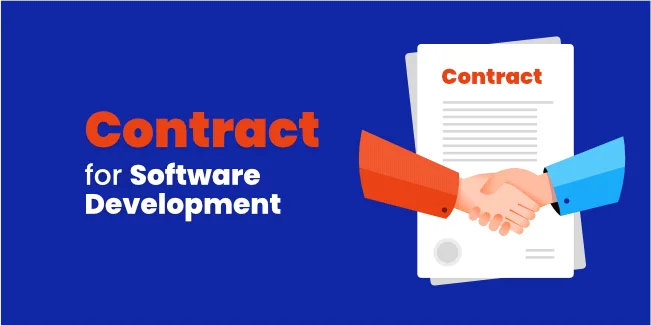business
development
software
contract
Contract for software development - All You Need to Know

Nowadays, a software development contract is the most obvious and natural thing in business. A software development contract is a fundamental aspect of any project. The contract is essential as it describes the development services you expect from your partner. A well-structured contract defines the scope of responsibility in the event of any dispute and prevents unpleasant surprises. In addition, it should contain all the details of the project.
This article will explain what a well-structured contract should contain and what you should pay attention to.
What is a software development contract?
A software development contract is a written, legally binding document that sets out the terms of the cooperation between you and your development partner.
In many respects, software development contact is very similar to other maintenance contracts. The mutual agreement should contain such sections as the method of settlement, mutual obligations, payment schedule, time frame, conditions for terminating the agreement, and many more. However, software development agreements are much more flexible than other contracts, leading to ambiguities and a lack of effective protection for both parties. For this reason, it is so crucial that all key provisions are included in the contract. There are tons of software development contract templates on the Internet that various companies use. Of course, this does not change the fact that a lawyer must read and approve every contract because only he can check all legal aspects of the agreement.
Below you will find critical points that in our opinion - as companies with over 12 years of experience in software development - should be included in the software development agreement.
How to choose the cost structure?
Before you write a contract for software development, you must choose the cost structure and contract type that will work best for your project's duration, scope, and budget. Fixed budget and time & materials are the two most important categories to consider. Let's have a look at each of them in detail.
In this model, the cost of a fixed budget contract is determined before the project start date. The main distinguishing feature is that it requires exceptionally detailed planning of all works related to the project, which requires time and often specialist knowledge. In addition, the timeframe of the entire project must be very precisely defined. The disadvantage of this solution is almost zero flexibility and the lack of the possibility of changes during the project duration. But on the other hand, before starting the project, you know the final price of your product development service. The condition for success is "only" detailed planning of each stage of work.
-
When is the fixed budget model for you?
A fixed budget contract is an appropriate option if:
- Your project is short-term (up to 2 months),
- You have full documentation of the project,
- You have a tight budget,
- Your project is relatively simple, or you need only a few tweaks to your existing software.

A time and materials contract requires much less planning and preliminary preparations so that you can start your project much faster.
A time and materials contract is one in which you pay the developers for each hour worked. This model is used when the project is long and complicated, and therefore it is difficult to estimate the budget and the completion date.
However, projects settled in this model are very flexible, and it is possible to introduce changes to the project on an ongoing basis. Of course, this involves additional commitment from the project owner. It is essential to keep in touch with developers, monitor work progress on an ongoing basis, and make decisions about proposed changes.
However, the crux of this settlement is that you agree to pay more if the project takes longer than originally expected. On the other hand, this settlement method gives the software developer time to refine the project and propose thoughtful solutions that will translate into the business success of the final product. He makes reasonable efforts to ensure that the project is the best.
-
When is the time & materials model for you?
This solution is suitable when:
- Your project is long-term (over 2 months)
- Your budget is not tight,
- You do not have full and detailed project documentation,
- You are open to changes and the recommendation of a software developer.
Key elements of software development contracts

The software development contract should clearly state what you expect from the vendor. To avoid misunderstandings, the agreement must precisely define the terms of cooperation. It is necessary to precisely define the scope of the project and your requirements for the other party. Do not forget the attachments to the contract, such as the exact specification of the project, specified functions, maintenance services, or the number of versions allowed.
The procedure for making changes to the project should also be described. A good solution is a provision stating that any changes made to the draft by any parties should be made in writing and upon prior approval.
In this part of the contract, you must carefully describe the price and date of the project. Remember to define development stages along with project milestones.
Provide hourly rates and define a completion date for each stage of development and the entire project. Delays can happen in any project - both on the developer's side (delay in the project implementation) and on your side (e.g., delay in payments or too-long decisions that affect the project implementation date). Therefore, each contract must contain provisions regulating these issues so that both parties feel comfortable and motivated to work.
Acceptance testing is when you can access the software and verify that it meets your requirements and specifications. The contract should specify who is responsible for conducting the tests (you or the supplier) and how long the testing process takes. Generally, tests are carried out after each stage of the project, so this point should also be included in the detailed description of the project. It is also necessary to describe the test acceptance procedure (e.g., the developer written notice about the test results) and the procedure for applying corrections resulting from tests. Don't forget to set deadlines for testing, approval, and changes.
-
Intellectual property rights

It is one of the most critical parts of the software development services contract. This section should clearly state your ownership of the source code, design, patents, copyrights, and trade secrets. In the event of termination of the contract, you should immediately become the owner of what has been done so far. The software developed is the customer's property, and the contract should clearly state this. However, sometimes it happens that due to the lack of a contract or too general provisions, the rights to software's intellectual property remain with the contractor. Therefore, ensure that your software development agreement clearly states that the source code is yours and that you have the right to use and modify it. All materials created due to the project implementation should be handed over to the client (such as mock-ups, plans, etc.). If there are copies on the partner's side, they should be destroyed.
The confidentiality clause is typical of most service agreements but is especially crucial in the IT industry. Determine which data you believe should be kept private and the consequences of releasing it.
In most software development contracts, the confidentiality provisions are kept in the contract itself, which means that even after the agreement is made, confidentiality should be maintained.
-
Warranties and liabilities
You may seek to have any vendor you deal with agree to: documents and provide an inventory of third-party materials, ensure no back door access, and comply with your company's rules. Consider that the software development company may refuse or restrict its merchantability and legal compliance responsibilities based on how you intend to utilize it.

The vendor will also most likely reject any responsibility for losses and injuries you might incur as a result of using or selling the software.
There should be indicators in each contract that will measure the success of your project. Make every effort to ensure that the selected indicators are measurable and precise. In some cases, defining the methodology for calculating individual indicators is necessary.
Well-chosen and described indicators will properly motivate your partner, and you will be sure that precisely the project you wanted was created.
Even with a problem-free project and a great relationship with your partner, settlements may become a bone of contention. Therefore, make sure that this section is included in your contract. It will protect you from unnecessary misunderstandings and unexpected bills, especially if your agreement is not of the fixed price type. You need to know the exact developer rates and rates for additional, specific services. Please include an exact payment schedule in the contract and specify the consequences of non-compliance. Remember that payments can be linked to the implementation of individual stages of the project, i.e., you will pay a part when a given stage of the project has been completed.
Wrapping up
You'll be better prepared for the success of your project if you have a solid software development contract. A well-drafted contract may help prevent expenses and poor product quality. It can also be a good jumping-off point for future collaboration with a service provider.
Ensure your software development agreement includes intellectual property rights, confidentiality, assurances, commitments, success rates, project scope, payments, and timeline to meet your needs. If you are not ready to prepare the contract yourself, decide to cooperate with a professional software development company. We have been implementing projects for our clients from start to finish for over 12 years. Our experience allows us to accurately advise technological solutions and the type of contract that will suit your needs.